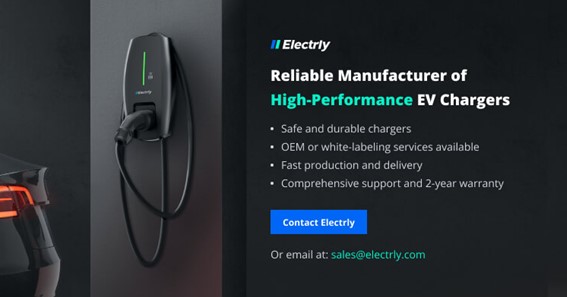Electric trucks are quickly gaining popularity since they provide a more economical and environmentally friendly option to standard diesel-powered trucks. However, one of the biggest challenges of electric truck ownership is charging. Charging an electric truck requires a different approach compared to conventional cars or trucks.
Since electric trucks are larger, they have a higher energy storage capacity and may use different charging systems, making it necessary for fleets to understand and adapt to unique charging infrastructure.
This article will delve into the importance of charging infrastructure for electric trucks and examine the challenges and opportunities associated with its development.
Introducing Electrly E-Truck Charger
The Electrly EV charger is a fast and versatile charging solution for electric trucks. With its products like PD20 Series of 20kW, Rocket FC120 of 120kW, Turbo FC60 of 60kW, the Electrly charger can quickly charge an EV battery. It is also compatible with many EV trucks, making it a convenient option for owners and fleet operators to charge an E-truck. You should try this if you’re looking for a flexible solution for your charging needs.
Electrly’s high-power charging infrastructure has been specifically designed to provide efficient and reliable charging solutions for electric truck fleets. With a maximum of 120kW of charging power, their DC fast charger ensures that trucks are able to recharge quickly, therefore keeping their downtime to a minimum.
Electrly’s multi-vehicle charging feature enables up to three trucks to charge simultaneously, delivering space-saving and optimal capacity utilization benefits. These charging solutions can be implemented in a scalable manner, and can be seamlessly integrated with the current truck fleet management system.
Electrly’s chargers include dynamic load management capabilities which adjust the charging power to avoid overloading the energy supply, thereby lessening the risk of power outages and minimizing the impact on the grid. In addition, the scheduling feature allows electric trucks to be charged during off-peak hours, reducing energy costs and generating significant savings.
Electrly chargers are fitted with advanced safety measures to guarantee secure operation of fleets, including overvoltage and overcurrent protection, short-circuit protection, and ground fault protection.

The Basics of Charging an E-Trucks
Electric trucks, also known as e-trucks, are gaining popularity as more companies aim to decrease their environmental impact and decrease expenses. To own an e-truck successfully, it’s important to know the proper charging procedure. To begin, you must locate a charging station that is compatible with your e-truck. Next, connect your e-truck to the charging station with a charging cord. Your e-truck will commence charging automatically once it’s connected
Your truck’s battery size, the charging station’s pace, and the amount of energy it currently has will all affect how long it will take to charge. It is essential to follow the manufacturer’s guidelines and charge the e-truck regularly to maximize its performance. Following appropriate charging techniques will ensure your e-truck functions well for several years.
What Are Things to Consider When Charging an E-truck?
Below are some important facts to be aware of regarding chargers for electric trucks:
- Charging time: E-truck chargers can take longer to charge than passenger EV chargers due to the larger battery capacity of trucks. The duration required for charging a truck can vary depending on factors such as the speed of charging and the truck’s battery capacity, ranging from several hours to an overnight charge.
- Charging speed: E-truck chargers can deliver different levels of charging power, ranging from slow charging at 3 kW to fast charging at 350 kW or more. Fast charging can significantly reduce charging times, but it requires a high-power grid connection and specialized charging infrastructure.
- Connector types: E-truck chargers typically use specialized connectors and cables that are designed to handle high currents and voltages. Common connector types include CCS2, CHAdeMO, and Tesla’s proprietary connector.
- Infrastructure requirements: E-truck chargers require a high-power grid connection and specialized charging infrastructure, such as high-capacity transformers, switchgear, and distribution panels. They also need to be installed in a location that is accessible to trucks and provides adequate space for maneuvering.
- Cost: E-truck chargers can be significantly more expensive than passenger EV chargers due to their higher power and specialized components. The expense of setting up an e-truck charger varies from tens of thousands to hundreds of thousands of dollars, depending on the charging rate and infrastructure necessities.
- Compatibility: E-truck chargers may not be compatible with all types of electric trucks, as different manufacturers may use different charging standards and connector types. It’s important to check the compatibility of the charger with the truck before installing or using it.
What are the most common e-truck charging standards?
There are multiple e-truck charging standards globally, including the widely used Combined Charging System (CCS) in North America and Europe. Another common standard is the CHAdeMO fast-charging standard originated in Japan. For Tesla electric vehicles (including the Tesla Semi e-truck), the proprietary Tesla Supercharger standard is utilized.
A pantograph method, which includes an overhead pantograph arm from the charging station to the vehicle roof, and inductive charging, which is presently in the early innovation stages, are also possible charging techniques for e-truck charging. Multiple factors, such as charging speed, infrastructure, and system compatibility, will influence the preferred charging standard choice for e-trucks.
Factors to Consider When Choosing a Charging Truck and Charger
Selecting the right charging truck and charger is critical to owning an electric vehicle. Factors like cost, compatibility, and charging speed should also be considered when selecting the best alternative.
- Speed: The charging speed is crucial since it determines how quickly the battery will recharge. Depending on the size of the battery pack, frequency of use, and distance between charging stations, one may require a charging truck and charger with high kW output to recharge the battery quickly.
- Compatibility: Compatibility is crucial as different vehicles have different charging standards and requirements. Therefore, ensuring that the chosen charging truck and charger are compatible with the electric vehicle’s charging standard and voltage requirements is vital.
- Cost: Cost is an important consideration and affects the budget. It is important to select a charging truck and charger within the budget while still meeting the charging needs.
Tips for choosing the best charging truck and charger include determining charging needs by assessing driving habits, researching the available charging options, comparing costs, and checking for additional features such as mobile apps. Also, choosing a renowned brand with a track record of dependability and customer service is essential.
Click here – Acing the Natural Science Test: Your Ultimate Guide to Exam Preparation
Conclusion
The development of charging infrastructure is crucial for the widespread adoption of electric vehicles, including charging trucks. The availability of charging stations is a critical factor affecting consumers’ decision to switch to EVs. The difficulties of charging infrastructure development, including high prices and technical concerns, can be overcome through public-private partnerships and government incentives.
The Electrly EV charger is a fast and versatile charging solution that offers high charging speed and compatibility with a wide range of EV models, including charging trucks. It offers smart features that regulate charging rates to prevent power infrastructure overload, making it a reliable and efficient charging option.
When selecting a charging truck and charger, you should consider charging speed, compatibility, and cost factors. You should also prefer reputable brands with a track record of dependability and customer service track record.
Overall, charging infrastructure development and the adoption of innovative charging solutions like the Electrly charger is critical for the growth of the EV market and the transition to sustainable transportation.

